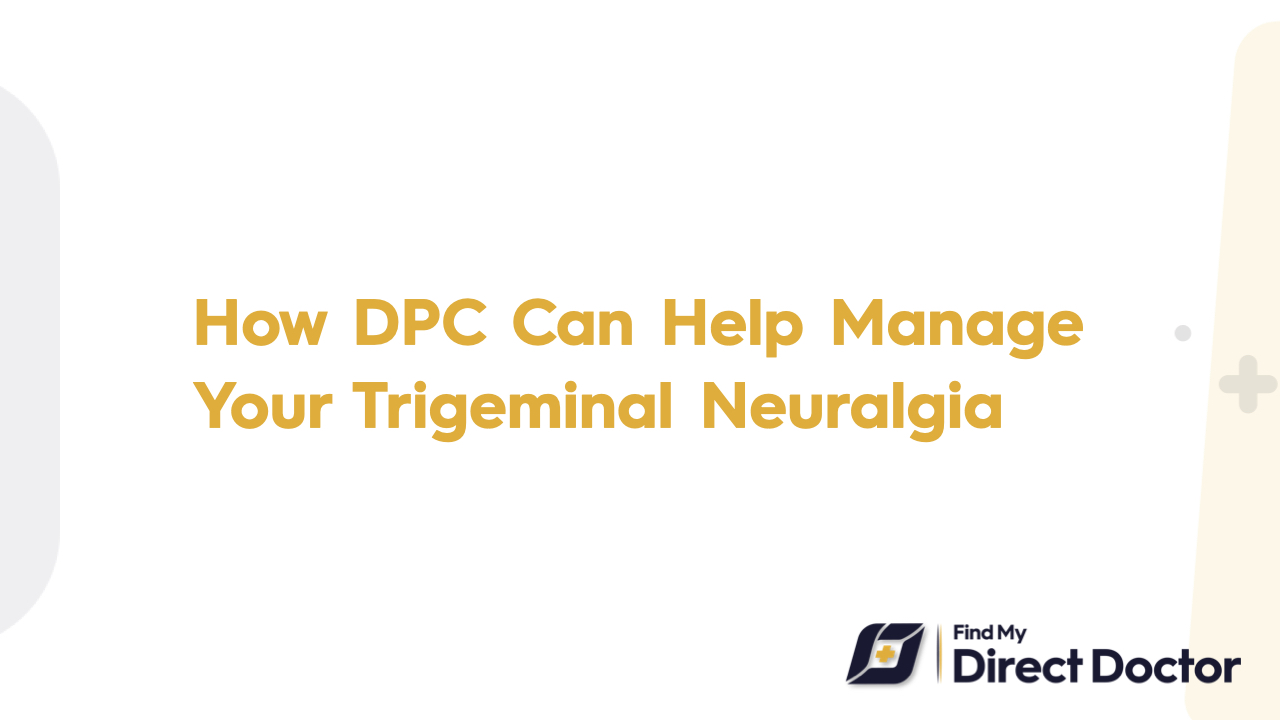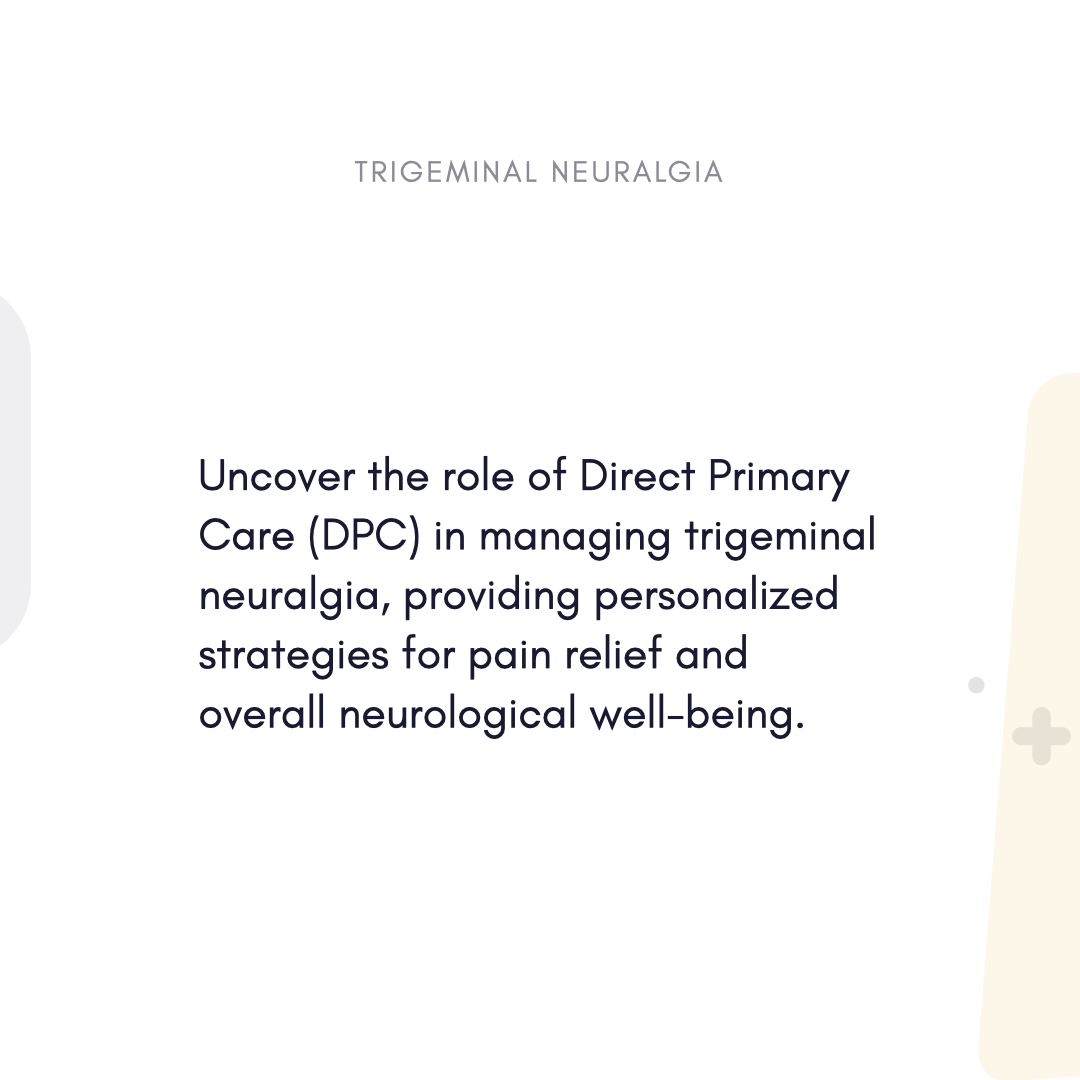Trigeminal Neuralgia and Direct Primary Care (DPC): Precision Care for the "Suicide Disease"
You know the agony of trigeminal neuralgia (TN) if you have ever been struck by sudden, electric-shock facial pain or feared brushing your teeth due to agony. Called the "suicide disease," TN affects 15,000 Americans every year and usually results in isolation and hopelessness. Direct Primary Care (DPC) presents a patient-centered approach to TN management, combining fast medication changes, reasonably priced treatments, and techniques to take back your life.

Trigeminal Neuralgia: Understanding Its Effects
TN results from trigeminal nerve compression that causes:
- In the jaw, cheek, or forehead, pain like lightning.
- Brushing, chewing, or even wind exposure can set trigger zones.
Types:
- Type 1 (TN1) pain—episodic, shock-like.
- Type 2: Constant, burning pain.
Complications:
- Eat avoidance-related malnutrition.
- Anxiety, despair, or suicidal thoughts.
How DPC Changes Under TN Care, Direct Primary Care (DPC), Patients Pay a Monthly Fee Usually Between 50 USD and 150 USD for Unlimited Access to Their Primary Care Physician.
For TN patients, this translates into no surprise bills, no waiting months for neurologists, and treatment emphasizing pain control and dignity.
Here's why DPC distinguishes itself:
1. Early, Guideline-Driven Therapy
DPC doctors follow AAN and IASP recommendations including:
- First-lines: oxcarbazepine and carbamazepine.
- Dose titration is side effect and pain diary-based adjustment.
- IV fospentytoin for status neuralgicus follows emergency procedures.
2. Reasonable, multimodal therapy
- By providing generic anticonvulsants at wholesale rates (10 USD instead of 200 USD+), DPC clinics help to lower costs.
- Working with pain clinics for cash-pay nerve blocks (300 USD vs. 1,500 USD).
- Offering telehealth visits for unexpected flare-ups.
3. Constant, Empathetic Assistance
Patients with 24/7 access to your DPC doctor can:
- Taper meds should side effects (such as vertigo) show up.
- Plan coordinated MRIs to rule out tumors or MS.
- Get mental health tools for depression connected to Tennessee.
DPC's Personalized Pain Management Benefits for TN Patients
- Each visit, DPC doctors spend 30 to 60 minutes developing plans including:
- Drug combinations: Add baclofen or gabapentin to carbamazepine.
- Non-pharmacologic alternatives: TENS devices, acupuncture.
- Microvascular decompression referrals are part of surgical coordination.
Financial Restraints
- There are no co-pays for regular med checks.
- Botox injections at 400 USD instead of 1,200 USD+, elsewhere.
- Avoidance of ER visits guided by proactive crisis management.
DPC tackles holistic health integration:
- Diet: Soft food diets during flares.
- Dentistry: Working with TN-aware doctors.
- Sleep hygiene: Control of insomnia connected to pain.
Personal Success Stories from Real Life
- Case 1: Using DPC's oxcarbazepine + gabapentin combo, Linda, 58, cut attacks by 80% and avoided surgery.
- Case 2: Mark, 45, saved 15,000 USD by accessing gamma knife radiosurgery through DPC's neurosurgeon network.
Ask questions about trigeminal neuralgia and DPC.
- Q: Is TN able to be cured?
- A: DPC helps control symptoms to almost normal function even though it cannot be cured.
- Q: DPC is reasonably priced for long-term TN treatment.
- A: Indeed. Every year, members save 30–50% on specialists, imaging, and medications.
- Q: What should I do if I need a neurologist?
- A: A DPC shares records and arranges discounted visits to prevent repetitious behavior.
Why DPC Works for TN Patients?
Early intervention is stressed by the Facial Pain Association in order to avoid disability. DPC delivers this via:
- Med changes made same-week instead of months-long delays.
- Equipping consumers: Trigger avoidance: instruction
- Streamlining expenses: One monthly cost pays for unlimited coordination of care.
Get Back on Track with DPC
Trigeminal neuralgia does not have to control your days. Every change, every therapy, every moment of relief—you have a partner who listens, innovates, and stresses your comfort with DPC.






